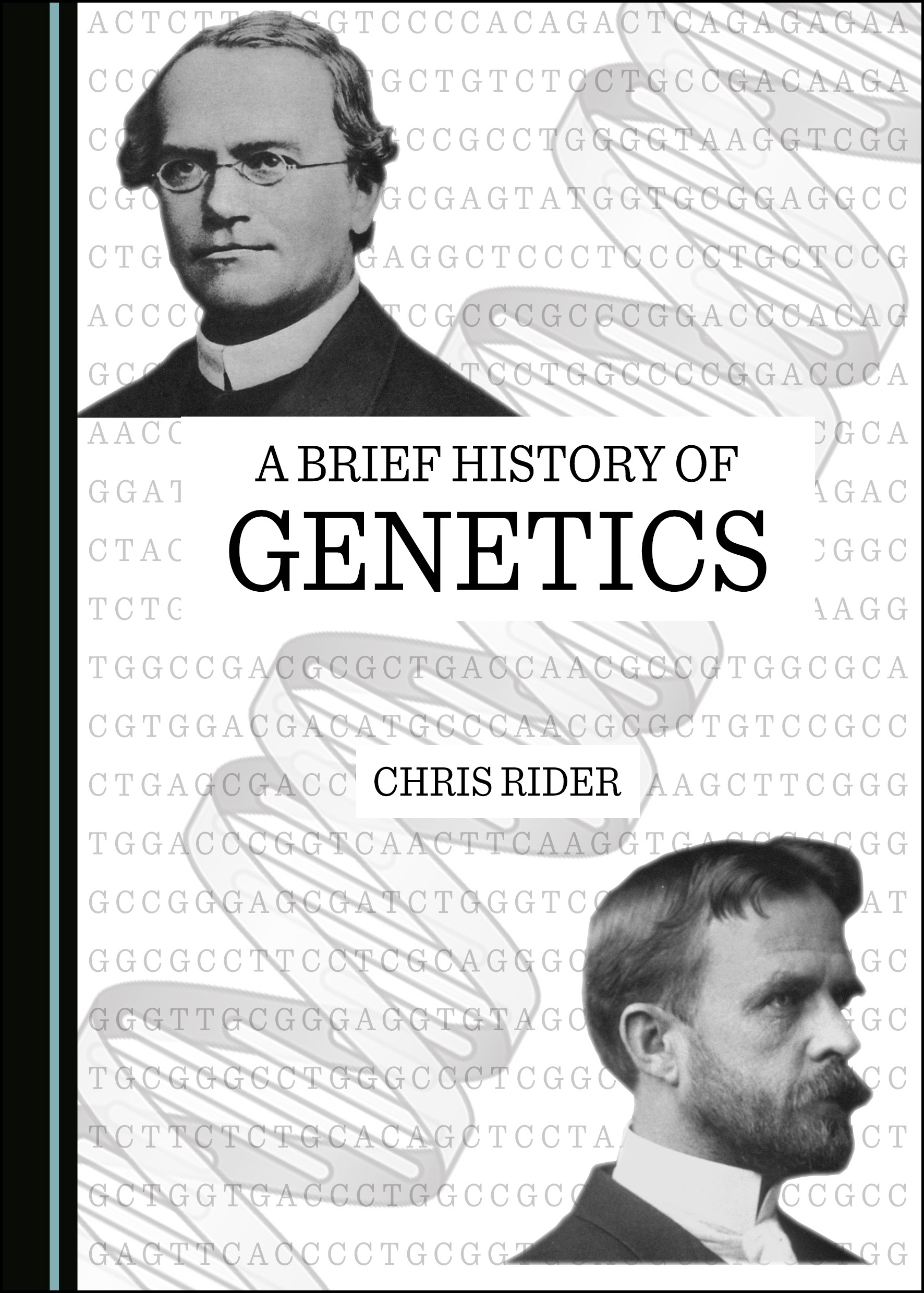Articles of interest
15th January 2021
Book in Focus
A Brief History of Genetics

By Chris Rider
Since its origin in the 1850’s, Genetics has made increasingly rapid strides. Gene technologies have provided us with new and entirely novel medicines, better understanding of cancer and other diseases, novel vaccines and even new approaches to solving crimes. They also have the potential to change our foods, and banish some inherited diseases for good. However, for all it’s achievements, Genetics continues to be a highly controversial branch of science.
In this edition of Book in Focus, Dr Chris Rider introduces A Brief History of Genetics, and in doing so seeks to rectify certain misconceptions over a branch of science that has already had a transformative effect on our world, whilst also looking ahead to what may be in store for the future.
Genetics, the science of inheritance, originated in the 1850s with straightforward but clear-sighted plant breeding experiments conducted by a single scientist, Gregor Mendel, working in a monastery garden in what is now the Czech Republic. His findings were so ahead of their time that his work was all but lost to science. However, following their rediscovery several decades later, after Mendel’s death, the field of genetics made increasingly rapid strides. A key milestone was the identification of the genetic material as DNA, which was finally established in 1944. From there on, the pace of progress in genetics had been astonishing. By the 1960s, the genetic code had been cracked, so that we could read the information stored within DNA, often referred to as ‘The Code of Life’. The culmination of this work has been the complete sequencing of the human genome in recent years, and now the sequencing of the genomes of many other species too. Our contemporary knowledge of biology and medicine depends heavily on genetics.
Gene technologies have now provided us with many benefits. Some of the most important new blockbuster medicines, used to treat a variety of serious diseases including rheumatoid arthritis and cancer, are artificial antibodies. Both a full understanding of the genetics of naturally-occurring antibodies and the use of sophisticated gene-splicing methods were needed for their creation.

Gregor Mendel, a founding father of Genetics. Source: Wikipedia Commons
The genetic analysis of various diseases, not just inherited conditions, but also cancer and common causes of sight loss, has advanced our understanding of these illnesses, and now offers new treatments. Elsewhere, DNA fingerprinting is now an established approach to solving crimes, establishing both innocence and guilt. The analysis of crime-scene DNA is now a routine approach to the investigation of major crimes.
The COVID-19 virus, with its major impact on global society and trade, was first unambiguously identified by genetic sequencing, and a gene-based testing method of high sensitivity is being used worldwide to diagnose new infections and to map the spread of the pandemic. The ultimate resolution of this pandemic will depend on developing new vaccines. The development and manufacture of these are completely dependent on genetics, which has enabled them to be generated at quite unprecedented speed.
The power of genetics gives us the potential to make selected changes to our agricultural crops and our livestock. This raises issues of safety and ethics. As such, genetically modified (GM) foods are currently restricted or banned in some countries. However, is this totally wise in a world where the human population is burgeoning and the sustainability of our conventional agriculture and fisheries is questionable?

The discovery of DNA, 'The Code of Life', was among the most significanct scientific breakthroughs of the 20th Century
Another controversial area of the application of genetics lies in the prospect of altering the genes of future human generations in a targeted way. On the one hand, this could banish serious inherited diseases from affected families for good, but, on the other, it would potentially allow the production of designer babies. In any case, can we be certain that such tinkering with the genes of future generations is entirely safe? Currently such human gene editing is prohibited.
Society must now decide the extent to which the power of gene technology should be harnessed. However, there is currently a large disconnect between the forefront of genetics and most people’s knowledge of the science. This book serves to bridge this gulf. To make the subject accessible, the development of genetics is described on a historical basis, an approach which helps explain the concepts as they have developed in turn. Being aimed at a lay readership, a basic analysis of the underlying science is provided, and any scientific terminology is fully explained, in part through a comprehensive glossary. The various applications of genetics in our everyday lives, their progress, and their potential and current limitations, are also discussed.
Dr Chris Rider gained his BSc followed by a PhD from the Department of Biochemistry at Sheffield University, UK, where he continued as a Medical Research Council-funded researcher, also being appointed as an Honorary Lecturer. He then moved to Royal Holloway University of London, eventually becoming Reader in Matrix Biology, where he supervised externally-funded biochemical research on topics encompassing neuroscience, the immune system, plant molecular biology, HIV and growth factors. During this time he also spent a 12-month sabbatical research period as Visiting Assistant Professor in the Department of Biological Chemistry at Johns Hopkins University School of Medicine, Baltimore, USA. Following his retirement from full-time employment, he remains a Visiting Lecturer at Royal Holloway. During his career, he has published more than 40 peer-reviewed research papers, co-authored two scientific reviews, and written two academic book chapters.
To learn more about Dr Rider and his work, you can visit his website.
A Brief History of Genetics is out now in Hardback and Ebook formats. Enter the code PROMO25 at the checkout for a 25% discount. Click here to access a free 30-page sample.










